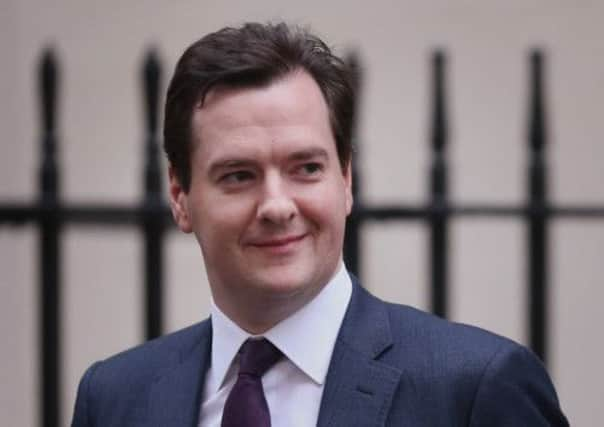Treasury faces ‘large losses’ on mortgage help plan


The “Help to Buy” scheme was at the heart of the Chancellor’s Budget last month and aims to make it easier for buyers who cannot raise deposits of up to 25 per cent to get a mortgage.
The Commons Treasury committee warns in a report today that the plans could skew the housing market and leave the UK government facing “large losses”.
Advertisement
Hide AdAdvertisement
Hide AdIn a further blow for Mr Osborne, ratings agency Fitch yesterday stripped the UK of its triple-A rating due to its “weaker economic and fiscal outlook”. The agency placed the UK on an AA+ rating, following Moody’s downgrade of UK debt in February.
The Help to Buy scheme consists of two elements, an “equity loan” and a mortgage guarantee, and is scheduled to last three years. The MPs’ report warns the problems in the UK economy are deep-seated and that the costly scheme could become a “permanent feature”.
The report said the Chancellor’s decision to introduce the initiative has made the government an active player in the housing market with a financial interest in maintaining house prices.
The government could be landed with large losses on the mortgages it has guaranteed because the lenders’ fee structure it intends to put in place to cover the costs will be “extremely difficult” to price in a way that “sharply curtails Exchequer risk”.
The report said: “There is a risk that if mortgage lenders begin to exercise reduced levels of forbearance, repossessions may rise and house prices subsequently fall lower than they would otherwise be. If this happened, and unless this risk was fully priced into the fee, then the Treasury could end up facing large losses on those mortgages it has guaranteed.”
Under the equity loan, new or existing homeowners will need to raise a deposit of 5 per cent of the value of the property they want to buy, but can borrow up to a further 20 per cent from the government on an interest-free basis. The biggest loan available will be £120,000.
The mortgage guarantee element will be available for all types of housing stock worth up to £600,000 from January. The government will guarantee up to 15 per cent of a mortgage, allowing people with 5 per cent deposits access to lending.
The committee warned the government will come under “immense” pressure to extend Help to Buy in three years’ time.
Advertisement
Hide AdAdvertisement
Hide AdIt said: “The unintended and unwelcome outcome could well be that a scheme designed to deal with a supposedly temporary problem in the UK housing market becomes a permanent feature.”
The committee lists questions the government must answer to “allay concerns that the scheme may have unintended and unwelcome consequences”, including what predictions it has made about the impact it is likely to have on house prices. Committee chairman Andrew Tyrie said: “The government’s Help to Buy scheme is very much a work in progress. It may have a number of unintended consequences.
“Without further detail, it is not possible to estimate its effects. The questions the committee has asked the government need answering.”
A Treasury spokesman said last night: “Help to Buy is targeted at helping people who aspire to own a home. By increasing mortgage availability, it will support the construction of new homes and help to boost the economy.
“All mortgages sold under Help to Buy will have to meet clear criteria that ensure responsible borrowing. Nobody wants to see a return to the bad old days of 125 per cent mortgages.”
Labour shadow Treasury minister Cathy Jamieson said: “We will only tackle the housing crisis and help first-time buyers if we have a major programme of affordable house building, which Labour called for as part of our jobs and growth plan but the Budget totally failed to deliver.
“And it’s astonishing that one month since the Budget, George Osborne has still failed to rule out people being able to buy second homes with a taxpayer guarantee.
“First-time buyers and people struggling to get a mortgage should be the priority for help, not a spare home subsidy for the small number who can afford to buy a second one.”
Fitch blow
Advertisement
Hide AdAdvertisement
Hide AdBritain’s credit rating suffered a fresh blow yesterday when Fitch became the second credit rating agency to strip the country of its triple-A rating.
The firm said it had downgraded the UK’s long-term credit rating from AAA to AA+ amid concerns over the “weaker economic and fiscal outlook”.
The move follows a similar downgrade in February from Moody’s. Rival agency Standard & Poor’s has said there is at least a one-in-three chance it will follow suit.
Fitch’s move is another setback for Chancellor George Osborne, who made it a key election pledge to safeguard the rating.